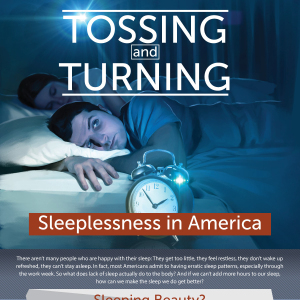Tossing and Turning: Sleeplessness in America
There aren’t many people who are happy with their sleep: They get too little, they feel restless, they don’t wake up refreshed, they can’t stay asleep. In fact, most Americans admit to having erratic sleep patterns, especially through the work week. So what does lack of sleep actually do to the body? And if we can’t add more hours to our sleep, how can we make the sleep we do get better?
Sleeping Beauty?
8 to 8.5
Hours of sleep per night adults generally require (1)
1 in 3
Adults who have insomnia at some point in their lives (1)
43% of Americans 13-64 say they rarely or never get good sleep on weeknights.
60% admit to suffering some sleep problem every night (snoring, waking constantly, feeling groggy in the morning). (2)
15% of adults 19-64 say they sleep less than six hours on weeknights. (2)
The Science of Sleep
Our bodies experience two types of sleep on a nightly basis: NREM (non-rapid eye movement) and REM (rapid eye movement) sleep. Since sleeping is a cycle, NREM occurs as we first fall asleep, with REM following about 90 minutes after and recurring about every 90 minutes.
NREM: 75% of night (2)
Stage 1: Light sleep, between sleep and wakefulness.
Stage 2: Onset of sleep, during which we become disengaged with surroundings. Breathing and heart rate are regulated and body temperature drops.
Stages 3 and 4: Breathing slows, muscles relax, tissue grows and repairs, energy is restored and hormones are released.
REM: 25% of night (2)
Brain and body are energized, dreaming occurs, body becomes immobile and eyes dart back and forth.
How Sleep Deprivation Affects the Body
Lack of sleep or insomnia can have multiple negative effects on the human body. Here are some of the most common and dangerous: (3)
Fatigue
It is estimated that fatigue due to sleeplessness is the cause of 100,000 car accidents every year.
Dulled cognitive processes
Sleep consolidates and affirms memories in your mind. Without it, people have a hard time retaining learned information from the day before.
Increased risk of heart disease, diabetes and stroke
90% of those with insomnia also have other health conditions.
Lack of sex drive
For men especially, lack of sleep can contribute to lower testosterone levels.
Depression
In a 2007 study of 10,000 people, it was found that those with insomnia were five times more likely to develop depression.
Premature skin aging
The stress hormone cortisol is released in great amounts in those with insomnia. Cortisol can break down collagen in skin.
Weight gain
People who sleep less than six hours each day are 30% more likely to become obese than those who sleep seven to nine hours.
How to Sleep Better
Most of us could use help falling and staying asleep. Just a few daily changes could mean the difference between a restless night and a restful one. (4)
1. Set a regular bedtime and stick to it.
2. Wake up at the same time every day; even on days off.
3. If you really need to make up for lost sleep, opt for a short (30-minute) daytime nap. Don’t sleep in.
4. Fight after-dinner drowsiness by remaining active at home before bedtime.
5. Avoid caffeine, alcohol and nicotine late in the day.
6. Light sources suppress melatonin production. Try not to use a computer, TV, smartphone or tablet just before getting into bed.
Sources:
1. http://deltasleeplabs.com
2. http://sleepfoundation.org
3. http://www.webmd.com
4. http://www.helpguide.org

